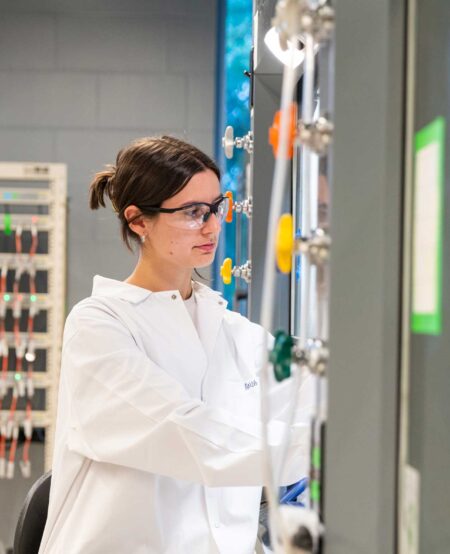- Length
- 4 years
- Degree
- Doctor of Philosophy in Engineering (Co-op Available)
- Type
- Thesis-based
- Options
Overview
The requirements for the Ph.D. degree in Biomedical Engineering can be satisfied through full- or part-time study.
The minimum course requirements are:
– Two (2) half-term courses at the 700 level beyond a Master’s degree from McMaster University,
– Three (3) half-term courses if the Master’s degree was completed at another university, or
– Five (5) half-term courses, at least three at the 700 level, beyond a Bachelor’s degree for direct-to-Ph.D. entry with a bachelor’s degree
Half of the required courses must have “BIOMED” in the course code or be cross-listed with SBME. One of the courses must be the core course:
- Students with an engineering background must take BIOMED 706
- Students with a health or life science background must take BIOMED 701
Students must also complete at least one 700-level course from the complementary discipline to their background (e.g., Engineering students must take a Health Sciences course; Health/Life Science students must take an Engineering course).
Course selection depends on the student’s undergraduate degree and must be made in consultation with their supervisor. All graduate-level courses require supervisory approval.
A PhD student is also required to pass a Comprehensive Examination designed to assess breadth of knowledge and the ability to synthesize and integrate ideas. Additionally, a PhD candidate must complete a doctoral thesis that demonstrates original research and mature scholarship. General University requirements for the thesis and oral defense will apply.
Students entering the program from a Bachelor’s degree are expected to begin at the Master’s level. Exceptionally strong students may be transferred into the Ph.D. program without completing the Master’s degree, subject to the approval of the School of Biomedical Engineering and the School of Graduate Studies (SGS).
Admission requirements
Admission is very competitive, so meeting/surpassing the minimum requirements does not guarantee admission to this program.
- Many variables are considered when the School of Biomedical Engineering is making a decision to recommend an applicant for admission, some of which include: research fit; available funding; the applicant’s statement of interest; the applicant’s specific industry/research experience outlined in their resume/CV; and the applicant’s reference reports.
- If all minimum requirements are met for admission to the Biomedical Engineering program, your application will be made available to all faculty currently accepting students.
- Students showing outstanding potential and high academic standing may transfer from the Masters program without completing the Masters degree. They must have completed at least one year of the Masters program and must have completed the Masters course requirement with an average of at least B+. Transfer will be approved following success in an examination consisting of the preparation of a written report describing the student’s research since entering the Masters program, as well as an oral presentation of the report before a faculty committee to be appointed by the program Director.
- Additional undergraduate coursework may be required for the Masters or Ph.D. programs on a case by case basis at the discretion of the Director and prospective Supervisor.

Application deadlines
Please refer to the McMaster University Graduate Studies application portal to view the program open dates and deadlines.
Application status
After you successfully submit your application, you will receive a confirmation email from The School of Graduate Studies (SGS) within a few days. (If you do not receive this email, please email biomedg@mcmaster.ca for assistance.)
The confirmation email will contain important information about how to access Mosaic so that you can follow the status of your application and your checklist of required documents. Typically, documents in the “Initiated” stage indicate that your application has not been marked as complete. This should not be immediate cause for concern, as Mosaic checklist updates are performed manually (not automatically); therefore–given the volume of applications received–you may need to wait up to a month to see a status update.
If after a month from your application submission you notice that some documents have remained in the “Initiated” stage, you should understand this to mean that your application is incomplete. Prior to the application deadline, you may email the graduate administrator (biomedg@mcmaster.ca) to gain clarity on any documents in the “Initiated” stage; however, any arrangements to receive supplementary documents are at the discretion of the graduate administrator (as all supplementary documents are supposed to be submitted together).
Programstructure
Seminar requirement
Students must attend all seminars in the Biomedical Engineering Program seminar series. They must present one seminar on the research they have carried out while enrolled in the program.
Students will be encouraged to present their research at appropriate conferences in Canada and internationally. Faculty support of students for this purpose will also be encouraged.
Interaction with industry will be an important aspect of the School of Biomedical Engineering. Students will benefit considerably from these interactions. Some students will work on projects in collaboration with industrial partners with whom the School of Biomedical Engineering has research agreements.
Thesis requirement
PhD candidates must present a thesis that embodies the results of original research and mature scholarship. Before preparing the final version of the thesis the student must be authorized to do so by the supervisory committee. When a majority of the supervisory committee has approved the final version of the thesis, it may be submitted to the School of Graduate Studies for examination. The oral defense will not be set-up until the report from the supervisory committee has been received and the date of the defense established.
The examining body will consist of the following members: the student’s supervisory committee, an external examiner, and two representatives of the faculty at large. The examiners will report to the Dean of Graduate Studies as to whether the thesis, and the student’s defense of it, are satisfactory or not.
If major revision is not required by the external examiner, an oral defense will be convened by the Dean of Graduate Studies, chaired by himself or his designate and conducted by all members of the examining committee.
PhD comprehensive examination requirement
PhD candidates are required to complete a comprehensive examination in the form of a research proposal on a topic related to but distinct from the student’s thesis topic. The written proposal will be prepared by the student and must include: 1) a critical survey of the directly related literature in the field, 2) an explanation of the relevant background, and 3) a research proposal related to the topic. The student will present the proposal at an oral examination conducted by an examining committee appointed by the Director of the program, consisting of the members of the student’s Supervisory Committee and at least one additional faculty member.

Need moreinformation?
How to apply
Understand every step, from applying, to accepting your offer and joining us on campus!
Request more information
Thank you for your interest in our Graduate Studies. Please fill out the form below, and we will connect with you to answer all of your questions.

